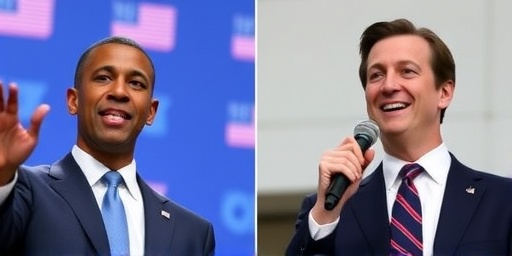In the wake of a transformative 2024 election cycle, the political landscape is shifting dramatically toward 2028, with prominent Democrats like Cory Booker and Gavin Newsom no longer shying away from their presidential dreams. As the field remains wide open following President Joe Biden’s decision not to seek re-election and Vice President Kamala Harris’s potential pivot, these leaders are signaling a new era of transparency in ambition. This openness could reshape the 2028 election, drawing in a diverse array of presidential candidates and setting the stage for one of the most competitive primary seasons in modern history.
Cory Booker’s Evolving Stance on National Leadership
Senator Cory Booker of New Jersey, who made waves with his spirited 2020 presidential bid, has recently taken a more direct approach to discussing his future in the White House race. During a recent appearance on MSNBC’s “Morning Joe,” Booker reflected on his past campaign, stating, “I’ve learned a lot since 2020, and the conversations I’m having now with voters across the country are about real solutions for the future.” This marked a departure from his previous reticence, where he often deflected questions about another run with humor or policy talk.
Booker’s strategy appears rooted in his strong Senate record on criminal justice reform and infrastructure, areas where he has garnered bipartisan praise. Polls from early 2025, such as a Quinnipiac University survey, show him leading among younger Democratic voters with 18% favorability in hypothetical matchups for the 2028 election. His focus on unity and progressive policies, including climate action and affordable housing, positions him as a bridge-builder in a fractured party. Insiders close to Booker note that he’s been quietly building a national donor network, raising over $5 million in the last quarter alone for his Senate PAC, which could easily transition to a presidential committee.
Yet, Booker’s path isn’t without challenges. Critics within the Democratic Party point to his 2020 campaign’s struggles in Iowa and New Hampshire, where he failed to break out of the mid-tier. To counter this, Booker has ramped up grassroots efforts, hosting town halls in key swing states like Pennsylvania and Michigan. “The 2028 election will be about who can inspire a new generation,” Booker told a crowd in Newark last month, hinting at his intent to reclaim the narrative of hope that defined his earlier run.
Gavin Newsom’s California Blueprint for the Presidency
California Governor Gavin Newsom, long viewed as a rising star among Democrats, has also stepped up his rhetoric, framing his state’s progressive achievements as a model for the nation. In a keynote speech at the California Democratic Convention in May 2025, Newsom declared, “We’ve proven in California that bold leadership can tackle climate change, expand healthcare, and build an economy for all—now it’s time to take that fight to Washington.” This statement, met with thunderous applause, was widely interpreted as a soft launch for his 2028 presidential ambitions.
Newsom’s appeal lies in his executive experience, having navigated California’s economy through the COVID-19 pandemic and wildfires while pushing ambitious policies like universal healthcare expansions and green energy initiatives. A recent Emerson College poll places him at the top of early 2028 election rankings among Democrats, with 22% support, edging out other potential presidential candidates. His fundraising prowess is unmatched; his gubernatorial campaigns have amassed over $100 million, and he’s already courting Silicon Valley donors for a national push.
However, Newsom faces scrutiny over California’s homelessness crisis and high cost of living, issues that opponents like Florida Governor Ron DeSantis have weaponized in past debates. To mitigate this, Newsom has launched a “California Comeback” tour, visiting battleground states to highlight successes like the state’s 4.2% unemployment rate and leadership in electric vehicle adoption. Political analysts suggest his charisma and media savvy could make him a formidable contender, but he’ll need to broaden his appeal beyond coastal elites to win over Midwestern voters.
Emerging Democratic Contenders Eyeing the 2028 Spotlight
Beyond Booker and Newsom, the Democratic bench is deepening with other presidential candidates testing the waters for 2028. Transportation Secretary Pete Buttigieg, fresh off high-profile infrastructure wins, has been dropping hints in interviews, emphasizing his Midwestern roots and appeal to independents. “The 2028 election demands fresh ideas and proven results,” Buttigieg said at a Detroit economic forum, where he touted the bipartisan infrastructure law’s impact on job creation.
Georgia Senator Raphael Warnock, riding the wave of his reelection victory, is another name gaining traction. Known for his pastoral eloquence and focus on voting rights, Warnock polled at 15% in a February 2025 ABC News/Washington Post survey among Black voters, a crucial Democratic constituency. Meanwhile, Michigan Governor Gretchen Whitmer, dubbed “Big Gretch” for her handling of the pandemic, has been building alliances in the Rust Belt, raising $20 million for Democratic causes since 2024.
These emerging figures signal a generational shift within the Democrats, with an average age under 55 compared to the 2024 field’s seniors. Party strategists predict a crowded primary, potentially featuring 10-15 candidates, which could lead to early debates as soon as late 2026. To prepare, many are investing in digital organizing; for instance, Buttigieg’s team has grown its email list to 2 million subscribers, leveraging social media for viral policy discussions.
Republican Rivals Gear Up for a Fractured Primary Battle
While Democrats dominate the current conversation, the 2028 election’s wide-open nature has Republicans scrambling to identify frontrunners. Vice President JD Vance, elevated after the 2024 win, is positioning himself as the heir apparent, but his polarizing style invites challengers. “We’re building on the America First agenda,” Vance stated at CPAC 2025, alluding to his Senate record on trade and immigration.
Other Republican presidential candidates include Florida Senator Marco Rubio, whose foreign policy expertise shines amid global tensions, and Ohio Senator J.D. Vance’s counterpart in the Midwest, Vivek Ramaswamy, the biotech entrepreneur who ran in 2024. A Fox News poll from April 2025 shows Vance leading with 28% among GOP voters, but 40% remain undecided, indicating a volatile field. Nikki Haley, despite her 2024 primary loss, is mulling a comeback, focusing on her appeal to suburban women and international alliances.
The GOP’s internal divisions—between MAGA loyalists and traditional conservatives—could mirror the Democrats’ progressive vs. moderate debates. Fundraising data from the Federal Election Commission reveals Republican PACs have already poured $50 million into early scouting, targeting states like Iowa and South Carolina. As both parties’ presidential candidates emerge, cross-party attacks are ramping up, with Newsom labeling Vance’s policies “out of touch” in a recent op-ed.
Shaping the 2028 Election: Voter Priorities and Strategic Shifts
The openness from figures like Cory Booker and Gavin Newsom reflects a broader strategic evolution in how presidential candidates approach the invisible primary—the pre-campaign phase of building support. With no incumbent, the 2028 election is poised to be the most unpredictable since 2008, according to political scientists at Harvard’s Institute of Politics. Voter priorities, per a Pew Research Center study, center on economic recovery (45%), climate action (32%), and healthcare affordability (28%), areas where Democrats aim to differentiate.
Both parties are adapting to technological changes; AI-driven voter targeting and deepfake regulations will play key roles, as seen in early 2025 state laws. For Democrats, the emphasis on diversity is evident: potential candidates include more women and people of color, potentially increasing turnout among underrepresented groups. Republicans, meanwhile, are doubling down on cultural issues, with 60% of their base prioritizing border security in Gallup polls.
Looking ahead, the crowded field could extend the primary calendar, with super PACs influencing early endorsements. By mid-2026, expect formal announcements from top contenders like Booker and Newsom, igniting a media frenzy. For voters, this means more choices but also more noise—navigating ads, debates, and scandals will test civic engagement. Ultimately, the 2028 election’s outcome may hinge on who best captures the post-pandemic zeitgeist, turning ambition into action and reshaping American politics for the next decade.








